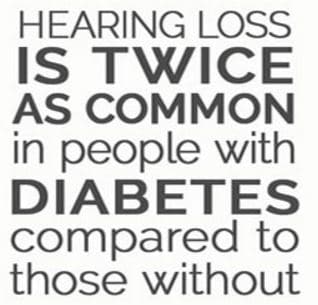Heart disease, stroke, diabetes, and hearing loss are health risks each of us face. As we are all aware, those risks increase with every year we manage to stay alive. Now, and perhaps not surprisingly, research is finding that some of those risks are related. In particular, a large cohort study published this month makes it clear that some hearing losses may stem from development of diabetes in young and middle aged adults.
Stats on Diabetes, Heart Disease and Stroke
- Heart disease and stroke account for some two-thirds of all diabetes-related deaths.
- Diabetics have higher heart disease death rates and their risk for stroke is 2 to 4 times higher than the non-diabetic population.
- As compared to people without diabetes, diabetics have about twice the risk of death as age-matched peers.
How They Relate to Hearing Loss
Bainbridge et al (2008) studied 5,140 adults and determined that hearing loss was much more common in people with diabetes. People with diabetes had a significantly greater rate of hearing loss than the non-diabetic population. In these cases, diabetes was the suspected origin of their hearing loss, leading to the recommendation that people with diabetes should be screened for hearing loss. Twenty-eight percent of the subjects had hearing loss in the low-mid frequency (below 2000 Hz) range, while 68 percent of all diabetics had high frequency hearing loss.
In a 12 year study Kim et al (2016) followed 253,301 adults for an average of four years each. At baseline, all subjects had normal pure tone audiograms and were placed into normal glucose levels, pre-diabetic, or diabetic groups for follow-up. Results showed a “moderately increased risk of future hearing loss” in the diabetic group. Specifically, “…the risk of incident hearing loss increased progressively with HbA1c levels above 5%.“
Based on the above, it appears that having type 2 diabetes may well be an independent risk factor for hearing loss.
Importance for Audiologists and Their Patients
In the past, audiologists tossed most hearing loss that occurred with age into the “age-related” basket, which wasn’t much help to the patients.
Now, if we’re keeping up with the research, we know that some of these hearing losses are not due to age, but to other diseases that are age-related. We can find those hearing losses sooner and diagnosis them more correctly if we make sure that people who are at risk for diabetes get their hearing tested.
Benefits to Consumers of Hearing Healthcare
First and foremost, independent of other age-related conditions, early assessment and treatment of hearing loss may prevent future communication problems that can lead to handicapping conditions — as in “I don’t go to movies anymore because I can’t understand what they’re saying.”
Second and importantly, future research will continue to clarify correlations and causalities linking hearing and glucose function, perhaps enabling broader use of hearing test measures for healthcare management.
References
Bainbridge et al. Diabetes and Hearing Impairment in the United States: Audiometric Evidence from the National Health and Nutrition Examination Surveys, 1999–2004. Ann Intern Med. 2008 Jul 1; 149(1): 1–10.
Kim M-B et al. Diabetes mellitus and the incidence of hearing loss: a cohort study. Int. J. Epidemiol. first published online November 6, 2016 doi:10.1093/ije/dyw243
feature image courtesy of Advanced Hearing Group







The loss of potassium (the key ion), is due degeneration of the stria vascularis membrane. When potassium levels drop significantly, then neurotransmitter channels are affected. The hearing sensitivity is affected more than the hearing loss, due to reduced rates of action potential firing from the cochlea to the hippocampus.
Diabetes is not a risk factor until the stria vascularis is implicated.